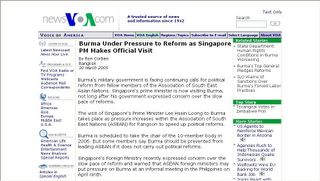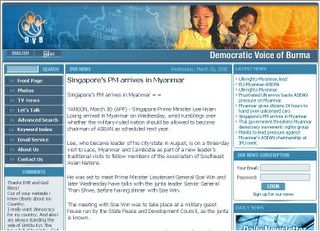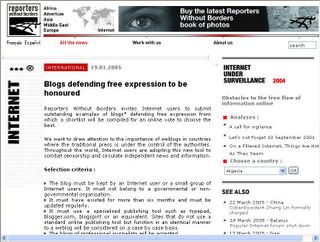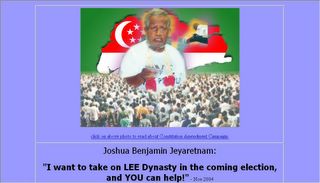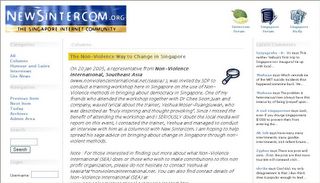Running down SingaporeMr Lee then accuses Dr Chee of running down Singapore because of comments the latter made about the political system in Singapore in speeches and talks he gave while overseas. Criticizing the undemocratic system that has been put in place to keep the PAP in power, has nothing to do with criticizing Singapore. In fact, Dr Chee argues that it is the PAP that has been working against the interests of Singaporeans. To
demonstrate this, Dr Chee wants Mr Lee to answer the questions below:
[On equating Singapore with the PAP]1. Does the Plaintiff agree that the PAP is a political party that is not equal to Singapore and that criticizing the government formed by the PAP is not equivalent to criticizing Singapore?
2. [On Singapore’s dealings with Burma]3. Did the Singapore Government, either directly or through one of the GLCs, ship, sell and/or re-export arms and ammunition to the Burmese government?
4. Did the Chartered Industries of Singapore ship, sell or re-export any of its products to the Burmese government?
5. If the answer is ‘yes’ to interrogatory 4, what are these products?
6. The US State Department has said that over half of Singapore’s investments in Burma "have been tied to the family of narco-trafficker Lo Hsing Han." Does the Plaintiff dispute this statement?
7. If the answer is ‘no’ to interrogatory 6, are Singapore’s investments still tied in with Lo Hsing Han’s family or any other drug trafficker in Burma?
8. If the answer is ‘yes’ to interrogatory 6, has the Singapore Government written to the US to protest this statement?
9. Was any investment money from the Singapore Government and/or GLCs invested (through the Myanmar Fund) with Asia World, a company set up by Lo Hsing Han?
10. Was the Plaintiff aware that the son of Lo Hsing Han, Steven Law, had been freely moving in and out of Singapore despite being strongly suspected of being involved in drug production and trafficking?
11. Was the Plaintiff aware that the Singapore ambassador to Burma had attended the wedding of Steven Law?
12. [On the secrecy and non-accountability of the GIC]13. As Chairman of the Government of Singapore Investment Corporation (GIC), will the Plaintiff direct that the GIC’s accounts (including all its investments and performance of its investments) be open for public scrutiny?
14. Will the Plaintiff reveal how directors of the GIC are appointed and what criteria are used for the appointment of directors?
15. Who develops the GIC’s investment policies and strategies, and how are investment decisions made?
16. With reference to the amendment to the Constitution in 2004 to allow the transfer of reserves to statutory boards and GLCs, does the Plaintiff agree that the change will make the management of the reserves even more opaque?
17. Will the Plaintiff ensure that every transfer of reserves to statutory boards and GLCs be made public in terms of how much is transferred and to which organization?
18. Will the Plaintiff reveal who will make the decision to make the decisions to allow the transfer of the reserves?
19. [On the Suzhou Industrial Park project]20. Will the Plaintiff urge the Singapore Government to reveal the accounts for the failed Suzhou Industrial Park project to allow Singaporeans to determine the losses that were incurred?
21. [On the non-publication of trade statistics with Indonesia]22. Did the Singapore Government, during which the Plaintiff was the prime minister, agree with the Indonesian government in 1974 (then under Suharto) to not publish statistics regarding the two countries?
23. If the answer is ‘yes’ to interrogatory 22, why was such an agreement made?
24. [On the cost of building HDB flats]25. Will the Singapore government direct that the accounts and books of the Housing Development Board (HDB) be open for public study so that a breakdown of the actual costs that go into the building of an HDB flat can be compared to the price at which they are sold?
26. Will the Plaintiff reveal the panel of law firms the HDB has been engaging in its conveyancing section since the HDB’s inception?
27. Will the Plaintiff reveal the number of HDB conveyancing cases handled by each of the law firms named in the answer to interrogatory 26?
28. [On the Chief Justice’s self-appraisal]29. Did the Plaintiff know before he appointed Mr Yong Pung How as Chief Justice that Mr Yong had written the following statement: "Far from being distinguished in the law, I can only describe myself now as a working member of the business community, who had merely the good fortune to have a background in legal training, and some practical experience in this honourable profession before descending into the depths of the business world…My acquaintance with the law ceased as long ago as 1970, and before then had been confined almost entirely to Malaysia…I had never
actually practised in Singapore…My final departure then from the profession in 1970 must be sufficient to allow judicial notice to be taken that I had neither the ability nor the inclination to persevere in the law."?
30. If the answer is ‘yes’ to interrogatory 29, why did the Plaintiff appoint Mr Yong as the Chief Justice when Mr Yong himself categorically said that he was neither able nor willing to practice law, much less function as the Chief Justice.
31. [On the torture of ISA detainees]32. Does the Plaintiff agree that detainees under the ISA in Singapore have been physically and mentally tortured?
33. If the answer is ‘no’ to interrogatory 32, will the Plaintiff call for a public inquiry to determine the veracity of the Government’s claims that ISA prisoners were/are not subject to torture?
34. [On lawsuit against Mr Tang Liang Hong]35. How did the Plaintiff obtain the police report that Tang Liang Hong had made about the PAP leaders during the general elections in 1996/1997?
36. Did the Plaintiff call for a press conference to disseminate Tang’s police report to reporters?
37. Did the Plaintiff use the information in the confidential police report that Tang lodged to sue the complainant, Tang Liang Hong?
38. If the answer is ‘yes’ to interrogatory 37, did the Plaintiff sue Tang Liang Hong in his personal capacity?
39. [On the intimidation of journalists]40. Did the Plaintiff meet with Mr Ernest Wong, CEO of Media Corp, Mr Mano Sabnani, Editor of Today, Mr Rahul Pathak, Deputy Editor of Today, and/or Val Chua, journalist with Today in or around 5 November 2003 following the newspaper’s publication of the article "SM Lee and the eye opening trauma in London"?
41. If the answer is ‘yes’ to interrogatory 40, why did the Plaintiff call for the meeting and what did the Plaintiff tell those present?
42. [On the incomes and assets of PAP ministers]43. Does the Plaintiff think that it is right for PAP Ministers not to declare their incomes and assets to the public?


